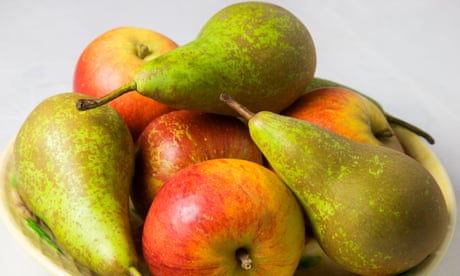- by foxnews
- 22 Jan 2025
Who tests your food for pesticides in Australia?
Who tests your food for pesticides in Australia?
- by theguardian
- 28 Sep 2022
- in news

Before you rush to give these two fruits up, however, consider this: apples and pears are among the few horticultural products tested by federal authorities to see if they comply with pesticide regulations.
The vast majority of fruit and vegetables eaten by Australians are tested under a self-regulatory scheme, run by the wholesale markets or major supermarkets. The results are not public.
The last major testing for pesticide residues by the federal food regulator, Food Standards Australia New Zealand (FSANZ), was on samples from 2013 and 2014, with the results published in 2019.
Understanding who is responsible for regulating pesticides in food and in the environment in Australia involves an Alice in Wonderland journey through a rabbit warren of regulators, both government and industry based. The Guardian counted at least 15 agencies involved.
The Australian Pesticides and Veterinary Medicines Authority (APVMA) is responsible for authorising the use and sale of agricultural chemicals in Australia and for seeking higher or lower residue limits with FSANZ.
It is also responsible for reviewing products if scientific evidence emerges of a problem.
As the Guardian has reported, many of these reviews can take years if not decades, which means potentially dangerous chemicals continue to be in use in Australia years after they have been withdrawn overseas.
Ensuring proper use of agricultural chemicals and testing for pesticide traces in food and in the environment falls to a collection of regulators: state, federal and industry self-regulation.
But the most recent ATDS that considered agricultural chemicals in food was the 25th survey completed in 2019. It used samples of 88 different foods collected during one week in May 2013 and one week in February 2014.
The researchers tested for 206 agricultural chemicals in the 88 foods. They used 506 composite samples which were derived from a range of states.
According to the FSANZ there were no public health and safety concerns for most chemicals used in food production.
The APVMA was notified, and after consultation with the industry, the regulator has now banned the use of prothiofos on grapes.
Some foods do not have MRLs set. The survey found agricultural chemicals in eight foods that have no permissible limit.
Four samples exceeded the set MRL.
The food authority concluded that because only a small proportion of the samples exceeded the MRL and were below the average daily intake limits (with the exception of prothiofos), the risk to human health was low.
The two more recent ATDS surveys have concentrated on specific issues: levels of persistent organic pollutants (POPs) in 2020 and levels of per- and polyfluoroalkyl (PFAS) in 2021. Both concluded that Australian exposure is lower than in other parts of the world.
At this stage, FSANZ said it does not have plans to test for specific pesticides in upcoming studies.
The Department of Agriculture, Fisheries and Forestry runs the National Residue Survey (NRS). Following scandals in the 1980s over pesticide and antibiotic residues in meat exports, importing countries now generally require animal product exporters to participate in monitoring programs. Participation is a requirement for government certification for export.
Beef, seafood and other animal exports are tested routinely and randomly with tracebacks possible in the case of a breach of the maximum limit.
There is no requirement for industries such as grain, horticulture or non-exporting animal product industries to undergo product testing with the NRS, but some do, a spokesman for the department said.
Apples and pears are among the horticultural products tested in the NRS.
Other plant industry participants include grain, macadamias and almonds. The results are published on the agriculture department website, with 2020-21 the most recent.
For the most part, commodities achieved full compliance. For instance beef achieved 99.96% compliance and pigs 99.24%. However, 7.1% of pears were over the maximum residue limit.
The results are not publicly available.
If banned chemicals were detected they were reported to state authorities, she said, but only some jurisdictions required reporting of exceedance of maximum residue limits.
But FreshTest only covers part of the market. Many growers now sell their produce directly to the major supermarket chains.
Coles also requires its growers to have certification, which includes an annual pesticide residue check, as well as conducting random checks of its fresh produce each month.
- by foxnews
- descember 09, 2016
President Trump's inauguration and travel: Here's when DC flights, hotel stays should decrease in price
Hotel and airline prices have spiked in response to President Donald Trump's inauguration, but it may take some time for Washington, D.C., travelers to see costs return to normal.
read more


